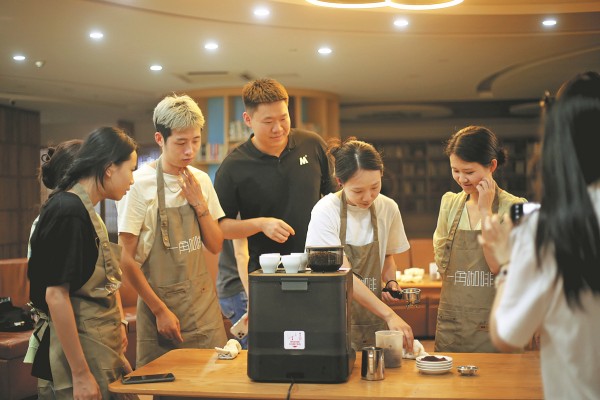
People with impaired hearing experiment with coffee-making techniques at Yijiao Coffee in Chongqing. [Photo/China Daily]
A cozy but quiet cafe at a hospital in Southwest China's Chongqing has attracted many caffeine junkies since it opened earlier this year.
Regulars are seen writing on digital tablets to order their coffee, and holding up little signs from the counter to tell if they want it hot or cold, with or without sugar.
People who visit the cafe for the first time may wonder why the staff and the method of ordering are a little different — it's because all the staff are hearing impaired.
The modern 120-square-meter coffee shop — Yijiao Coffee — is located in Chongqing's Liangjiang New Area.
The cafe, which translates to Corner Cafe in English, has 10 tables and can accommodate 30 customers. It serves more than 10 types of coffee, including a few classics and some specialties. To express "thank you", the baristas use latte art to draw smiling faces on the crème. The "Silent Americano" is the bestseller, according to Zhu Jiayun, founder of Yijiao Coffee and head of Yuanmeng Public Welfare Service Center for Disabled People, Chongqing's first public welfare organization that helps find employment for people with disabilities.
Zhu said it is the second branch of three branches of Yijiao Coffee. Yijiao was inspired by a famous children's book called The Missing Piece by late American illustrator Shel Silverstein.
"No one is perfect and may have a missing part that needs to be accepted by others," Zhu said.
To give back to society, Zhu noted Yijiao, which can also mean 0.1 yuan ($0.01) in Chinese, is the exact sum of money donated from each cup of coffee sold to a local public welfare fund for people with disabilities. He said by the end of this year, the three shops are estimated to donate more than 8,000 yuan.
For 53-year-old barista Zheng Yi who was born with hearing impairment, big changes have happened to his life since he started working in the Songshan branch. He noted before he became a barista, he had served as a community worker in the city's Shapingba district for years, and was paid less than one-third of his current wage. "I feel the concept of equality is gradually becoming rooted in our minds, and people nowadays are showing more and more patience to people like me."
"The environment is good and the coffee is superb. It costs only 16 yuan for an americano, much cheaper than other coffee brands," said Lu Zongyi, 45, a coffee lover of over 10 years. He said he heard about the shop in Songshan in January and has frequented it ever since.
The altruistic spirit of Zhu Jiayun, founder of Yijiao, to help the community was inspired by the devastating 2008 Wenchuan Earthquake in Sichuan province. On receiving an emergent order from the army for search and rescue, Zhu, a then newly appointed troop instructor, led a team of more than 20 to a collapsed five-story primary school building in Mianzhu, some 180 kilometers from the epicenter.
He said although his team later successfully found survivors in the location — many of whom had lost limbs, the experience had placed post-disaster trauma on him and he started to feel a call to help the people with disabilities. "They deserve a better life."
In 2017, Zhu retired from the army and started working in an office in Chongqing. But his eagerness to find his worth prompted him to resign in 2019 and start a career with two old comrades. Zhu named his team "3F" (family, friends and fools).
Since 2020, Zhu's charity Yuanmeng (meaning "dreams coming true" in Chinese), founded in 2019, has trained more than 3,000 people with disabilities in extended vocational training programs. People have been trained to become masseurs, wardrobe organizers, car washers, baristas and pastry cooks.
Last year, Zhu heard about Zeng Zheng, a young award-winning hearing impaired barista in Chongqing and came up with the idea of starting an entrepreneurial program, inviting Zeng as the barista coach.
The first group of 15 people signed up for a barista training program in October. After one month's intensive training with sign language teachers, 10 out of the 15 got the national barista professional certification.
Zhu said the group, aged from 22 to 51, had worked as street vendors, on factory assembly lines, or at fast food restaurants. "Longing for a decent job like as a barista is their biggest edge."
So far, three branches of Yijiao Coffee in Chongqing have provided jobs for 10 staff members, including six hearing impaired baristas and one intellectually impaired coffee deliveryman.
Zhu's team is planning to open six to 10 more branches in the city this year, which could offer at least 20 jobs for the group. "We provide a platform to drive societal awareness around sign language and deaf culture as well," he said.
By 2020, approximately 85 million people in China were living with disabilities, according to the China Disabled Persons' Federation.
"I once heard a story of a little boy who kept throwing the stranded fish back to the sea one by one, just like what we are doing," said Zhu. "Although it's far from helping the whole group, I believe our deeds will mobilize more and more strengths from the society."